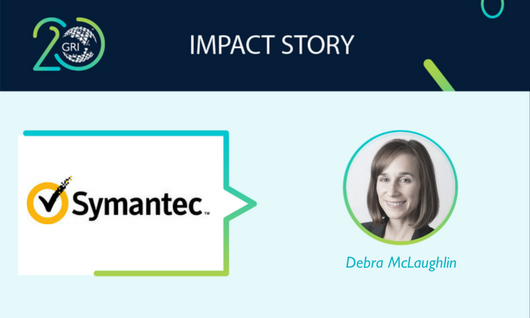Building the Business Case for Sustainability: Impactful CSR Through Cross-Functional Teamwork

Symantec, a U.S. computer software company puts materiality at the heart of their corporate responsibility work. We spoke to Debra McLaughlin, Sr. Manager, Corporate Responsibility at Symantec, who told us about how the company uses sustainability reporting to address its sustainability challenges and to communicate initiatives that create shared value.
Debra McLaughlin: Sustainability reporting is an important element of our corporate responsibility (CR) communication and stakeholder engagement strategies. Annual corporate responsibility reporting enhances Symantec’s brand and reputation by amplifying engagement with our stakeholders around our CR approach. Reporting demonstrates how our CR strategy and initiatives create value for our stakeholders. It also provides us with a vehicle for soliciting feedback from our stakeholders, which ultimately offers insights into shifting stakeholder expectations and concerns.
One of the areas almost all companies struggle with is moving from disclosing sustainability information to setting and working towards ambitious goals. This was also the case for Symantec with GHG emissions. Can you talk about how the business worked through this challenge?
Back in 2008, Symantec initially set a goal to reduce GHG emissions by 15 percent, by the end of fiscal year 2012. During that time period, Symantec’s business strategy shifted to include hosting and data storage, both energy-intensive services. We realized that it would be very difficult to meet the reduction goal that was set. Between fiscal 2010 and 2015, it was a challenge for the company to develop a new GHG emissions reduction goal, due to competing priorities internally and not being able to assemble the right group of stakeholders to work on it.
It was clear to us that the CR team could not develop or drive a new GHG emissions goal alone. In fiscal year 2016 we were finally able to bring together the right cross-functional team, which included Cloud Services, the office of Project Management, IT, Facilities and Corporate Responsibility. The right cross-functional team, coupled with support for a new goal from the Board of Directors, provided the right level of attention and support for the team to develop a new reduction goal.
The Nominating and Governance Committee, a committee of Symantec’s Board of Directors, has oversight over corporate responsibility. A quarterly CR presentation, focused on GHG emissions and reductions targets, triggered a request from the Board for a report on Symantec’s emissions. This request provided the directive needed to move ahead with setting a goal amid many internal changes and competing priorities.
GRI believes it’s important that companies more experienced in reporting begin moving beyond merely reporting their material topics into proactively working to address challenges. Can you give us an example of how Symantec has risen to this challenge?
Symantec’s philanthropic initiatives have been strategically aligned with our business for a long time, but a few years ago we decided that we want to do more. We wanted to develop a shared value initiative that would leverage Symantec’s unique expertise to address an important social issue. As a result, in 2014 we launched the Symantec Cyber Career Connection (Symantec C3), in partnership with the Symantec Foundation, to address the significant shortage of qualified cyber security candidates – a gap that is expected to reach a staggering 1.5 million open jobs by 2021, youth under-employment and the lack of diversity in the cyber security field.
Symantec C3 is a collaborative effort that provides a pathway for underrepresented and under-resourced young adults and veterans—many of who have not been exposed to this thriving field—to fill in-demand cyber security jobs and enjoy long-term, meaningful careers. It addresses four key challenges across the workforce pipeline including:
Excite - We help nonprofits and educators raise awareness of the long-term career opportunities in cyber security.
Recruit, Train and Certify - We recruit and train underrepresented populations into the field of cyber security.
Prepare for Jobs - We place students in cyber security internships and other on-the-job learning opportunities for training in real-world challenges.
Launch Careers - We connect program graduates to cyber security positions.
With Symantec C3, we are not only addressing the global cyber security workforce gap but also helping to change the trajectory of the tech workforce—specifically for women, minorities and veterans.
How has Symantec benefited from using the GRI framework and being a member of the GRI GOLD Community?
The GRI framework has served as a roadmap for how to prioritize Symantec’s corporate responsibility issues. Symantec embraced materiality at the very start of our corporate responsibility journey. Since GRI places a high level of importance on materiality analysis, we utilized the GRI’s materiality assessment process to identify which CR issues we should focus on as we shaped our work in the area. Since then, we have revisited and revised our materiality analysis every other year. This process has served as a guide to prioritizing what issues we should be working on internally and externally.
We also find a great deal of benefit from the reporting process itself, in terms of creating meaningful goals, publicly stating those goals and then holding ourselves accountable for progress against our goals.
In addition, Symantec has benefited from the GRI GOLD Community by utilizing the many continuing education opportunities GRI offers to GOLD members. These offerings help us to better understand the framework and standards, as well as provide access to other GOLD Community members to learn from their own experiences. In addition, we appreciated the opportunity to have a voice through the GOLD Community in how the GRI framework has evolved over time and now into the GRI Sustainability Reporting Standards which exist today.
With the GRI Sustainability Reporting Standards, companies are able to unlock the transformative power of transparency, while contributing to the common sustainability agenda and reaping the benefits of increased stakeholder trust. Join Symantec and hundreds of other organizations in the effort to create a sustainable global economy – become a GRI GOLD Community member today!

